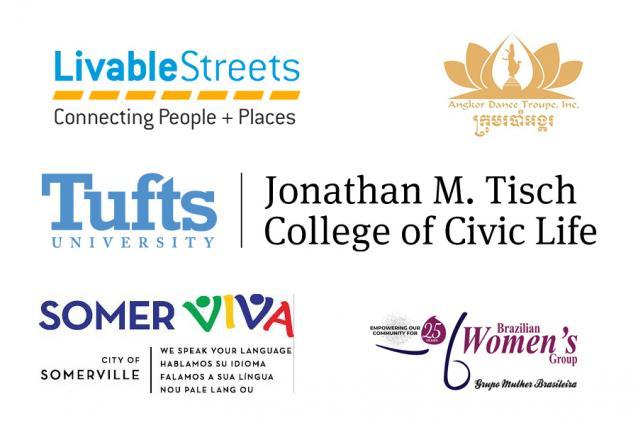Tisch College Community Research Center Awards $36,000 to Community-Based Projects

The Tisch College Community Research Center (TCRC) has awarded its 2020-21 grants to research projects that will advance the health of Brazilian immigrants during the pandemic, broaden the use of disaggregated gender data for infrastructure policymaking, and promote the transmission of culture and knowledge across generations of Cambodian Americans.
TCRC is a collaborative of community leaders and Tufts faculty and staff which supports joint research by community members with Tufts faculty and students. In the past decade, TCRC has awarded over $200,000 in seed and student grants to nurture research that explores local issues in fields like public health, environmental health, local economic development, and youth education.
“These projects, drawn from a competitive cohort of proposals, reflect the kinds of compelling questions that community organizations partner with Tufts faculty to explore," said Elaine Donnelly, Director of TCRC. "Across disciplines, these projects represent the importance of leveraging the deep expertise of both community and university partners to create valuable knowledge and impact.”
Read more about each project below:
Assessing the Impact of COVID-19 on the Health of Brazilian Immigrants (Somerville)
Partners: Brazilian Women’s Group, Somerviva, City of Somerville, Prof. Jennifer Allen (Community Health), Prof. Christiane Soares (Romance Studies)
Grant: $12,000
Summary: The goal of this proposal is to assess the impact of COVID-19 on Brazilian immigrants residing in Tufts’ host communities. Brazilians make up a large and growing proportion of immigrants to the U.S. overall, and Massachusetts is home to the second-largest Brazilian immigrant population in the country. Many Brazilians reside in Somerville, Medford, Cambridge, and Allston/Brighton. Over the past year, Tufts faculty (Allen, Soares) have partnered with organizations serving Brazilian immigrants (City of Somerville, Somerviva, and the Brazilian Women’s Group) to better understand health issues, priorities, and service gaps for these communities. Findings from our research conducted over the past year revealed that mental health, occupational safety, and domestic violence were critical issues affecting the Brazilian community even before COVID-19. It is likely that the profound economic impact of the pandemic—coupled with the shelter-in-place advisory, social distancing, and changes in immigration policies—has only exacerbated these issues. To address the critical need for information and data, we developed a community-based participatory study will seek to better understand the impact of COVID-19 on these issues, as well as the factors that impact COVID-19 testing, diagnosis and treatment among Brazilian immigrants in Tufts’ host communities.
Gender Fair Mobility: Closing the Gender Data Gap Towards an Equitable Urban Redevelopment (Boston)
Partners: Livable Streets Alliance and Dr. Rebecca Shakespeare (UEP)
Grant: $12,000
Summary: This project seeks to understand the mobility limitations that stem from gender inequities and gendered experiences on streets. The research examines how gender-disaggregated data can reveal mobility and design factors that specifically address the needs and experiences of women and non-binary people by generating gender-specific participatory processes and data analysis that elevate the experiences of those communities. Looking to understand how to incorporate a broader sense of gender-based accessibility within Boston, the research focuses on the City’s redevelopment of two major corridors, Columbia Road, and Tremont Street. To understand the perceptions of women and non-binary people of traveling on these corridors, both collectively and individually, this research combines surveys, interviews, sketch mapping, and geospatial analysis to identify spatial configurations that impact livability. This research seeks to define and characterize factors important to disaggregated gender groups, proposing guidelines to produce new urban configurations that grant the right to mobility at any time and place to women and gender-nonconforming people. As a collaboration led by María de la Luz Lobos Martínez (Community Engagement and Research Fellow at Livable Streets Alliance) and Dr. Rebecca Shakespeare (Lecturer in Tufts’ Urban and Environmental Policy and Planning), this research will inform neighborhood redevelopment through community-based collaborative processes, incorporating neighborhood ambassadors and Tufts students.
Engaging Memory and Knowledge Transmission through Music in the Cambodian American Community (Lowell)
Partners: Angkor Dance Troupe, Cambodian Vintage Music Archive, and Dr. Stéphanie Khoury (Music)
Grant: $12,000
Summary: How does one acquire knowledge of a given musical genre when most artists and most documentation disappeared decades ago? How does one expand a musical genre if one doesn't get to fully experience it? This is the situation Cambodian-American youth encounter when looking at the mid-20th century popular music movement, a movement that is considered emblematic of Cambodian modernity and cultural prosperity. This gap in musical experience is one of the consequences of the 1970s Khmer Rouge regime in Cambodia, during which most musicians, singers, and dancers died while traces of their art were destroyed. Yet this music is omnipresent in Cambodia and the diaspora through the proliferation of bootleg copies of limited sound archives and the nostalgia of the past that is associated with it. This collaborative research explores the meaning of Cambodian popular musical heritage for refugees and their families in the Cambodian American community of Lowell. The project is composed of two complementary initiatives: (1) working with Cambodian American youth in Lowell to collect their elders' narratives and memories of this music, and (2) supporting artists to reconstitute musical materials in order to facilitate intergenerational performances. Through a collaboration between the Tufts Music Department and the Angkor Dance Troupe, a Cambodian American community-based organization, this research project addresses questions of cultural heritage, collective memory, and creativity in relation to Cambodian pre-war popular music in the diasporic community of Lowell.